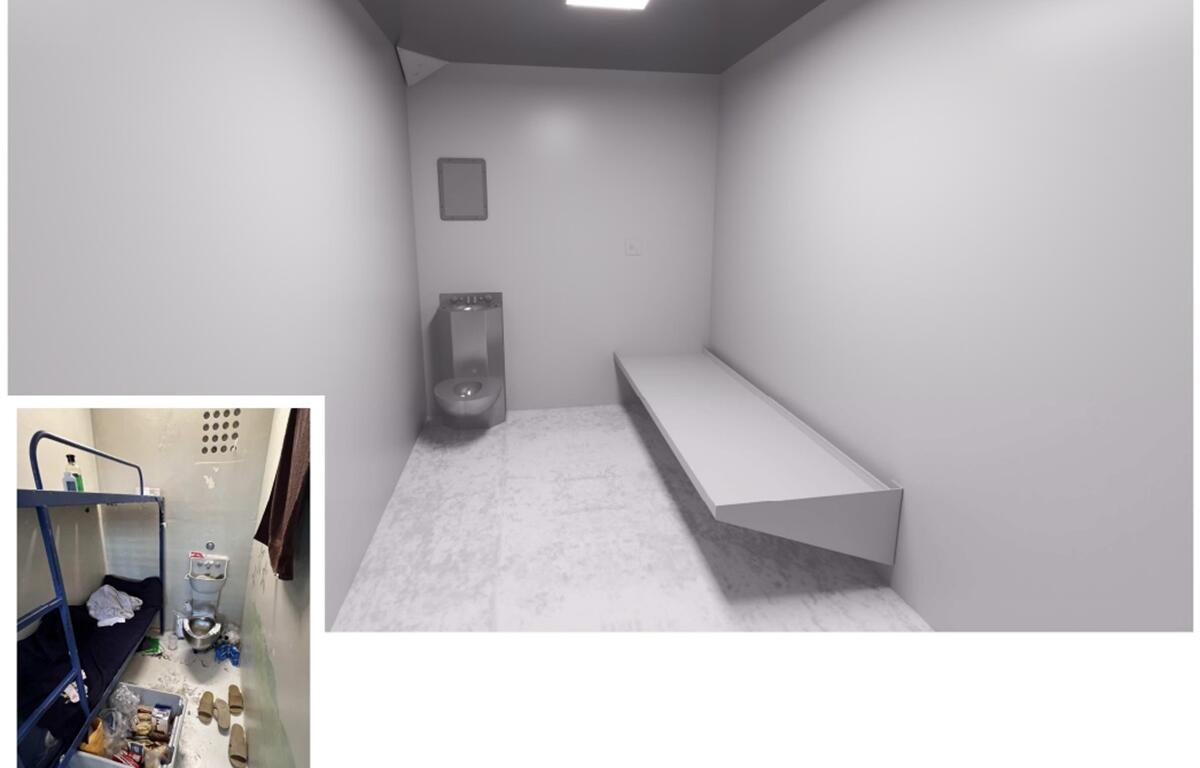CHARLOTTESVILLE, VA (CVILLE RIGHT NOW) The Albemarle-Charlottesville Regional Jail board voted Thursday to go forward with participating in a bond sale to finance proposed renovations to the 50-year-old facility, giving the go-ahead on a scaled-down version of the project, revisions necessary after all the bids for the work came in over the targeted $49-million budget.
“The board certainly understands that this work needs to be done,” ACRJ superintendent Martin Kumer told Cville Right Now on Thursday. “It’s all of our responsibility to make sure this facility is safe, humane, and up to code where it’s possible and feasible. They understand that. They’ve been on tours. They’ve seen what it needs. Putting it off any longer is not going to do anybody any good. It’s just going to get more expensive.”
The project still needs approval from the Charlottesville City Council and the Albemarle and Nelson County boards of supervisors, the three jurisdictions that use the jail.
Charlottesville will vote Monday, while Albemarle County on Wednesday and Nelson County on July 8.
Kumer also gave the board the formal notification that the contract has been awarded to English Construction, though negotiations on the particulars of the deal will continue. The board will vote on the contact’s final approval on July 10.
Kumer said, even in its scaled-down form, the renovations can make critical progress toward modernizing the jail and bringing it up to code.
“If we’re going to spend this money, do it right. Don’t put band aids on it,” Kumer said. “We’ve been band-aiding this building for 30-plus years. If we continue to band aid, the only people who are going to suffer are those who are living here, who are working here, who visit here and our service providers in the community who come here. They’re going to continue to suffer if nothing gets done.”
Kumer said the project will now focus on the demolition and rebuilding of the east wing, work that can be done without any disruption of service. Though the jail’s population is approaching 300, the highest it’s been in nearly three decades, Kumer said, all the inmates can be moved to other parts of the jail while the work is done, even if that takes over a year to complete.
Kumer said retrofitting the existing structure would be both ineffective and more costly if the jail is to comply with current codes and standards.
Among the most critical items, Kumer said, is the fact that the cells in the 1975-portion of the jail don’t meet minimum standards for size. That’s why the project calls for an expansion in the jail’s square footage, while not adding to its capacity.
“Cell sizes need to be almost twice as big. More showers, more tiles, more reaction, more classrooms, more sunlight,” Kumer said. “All those things are in the new codes. We won’t be able to achieve that if we don’t tear down the building.”
With the money that remains after that work, the ACRJ will focus on renovating its heating, ventilation and air conditioning system, something Kumer said he is “optimistic” can be accomplished in this phase of the renovation.
Thursday’s vote by the jail board was crucial for the project because Friday is the deadline to be authorized to move forward with the bond offering.
Opponents of the project balked at its $49-million price tag, pointing to parts of the proposed construction they deemed frivolous, including a new front-facing façade for the facility.
Now, much of that work will be stripped from the plans, though – as Kumer acknowledged – the price won’t go down any. Uncertainty surrounding the U.S. economy and tariff impacts on construction material, including steel, brought bids for the work in between $54 and $77 million.
Kumer said final specifics of the new plan are still being finalized, with the goal of coming in under budget.
Now, Kate Fraleigh, who works with the People’s Coalition, said she is concerned that the City Council and Boards of Supervisors don’t know what they’re voting on, since the reworked project’s details haven’t been solidified.
But Kumer noted that each jurisdiction has representation on the jail board, meaning they will have a say before those plans are finalized.
The Charlottesville City Council, for example, is represented by vice mayor Brian Pinkston.
Pinkston said the Council should be comfortable moving forward with the jail board’s recommendation on Monday.
“I think what we should be looking for is consistency with what’s been described to us over the last five years of the project,” Pinkston told Cville Right Now. “And nothing’s changed from the financing perspective, the dollar amount hasn’t changed. The scope has changed because of the cost, most of that, due to the steel tariffs. We need to approve something that we’ve already in principle agreed to. This is reaffirming commitments we’ve already made. It’s making good on commitments to the community and our neighboring counites.”
Pinkston said, in hindsight, the ACRJ could have done the complete renovation had it moved ahead more quickly with the jail board’s recommendation a year ago.
“We needed to go through a community process, but it ended up getting dragged out,” Pinkston said.
Kumer said he’s strived for transparency with the project over the five years it’s been in the works. The ACRJ website includes detailed information on the proposed work and on the bids, and he has personally conducted over 100 tours of the facility.
“I’ve invited anyone from the public to come to take the tour,” Kumer said. “Church groups, youth groups, school groups, I will take anyone on a tour so they can see what they’re paying for.”



